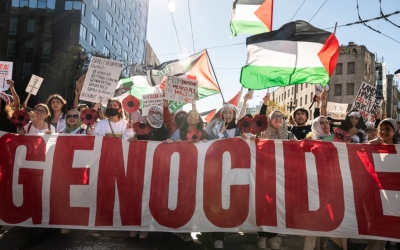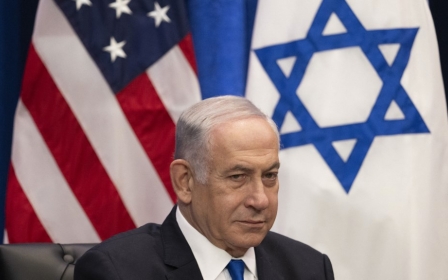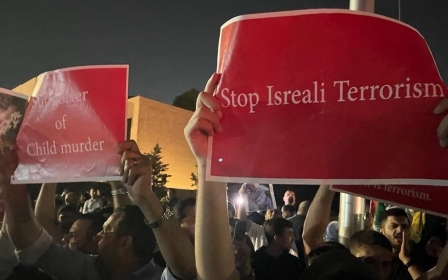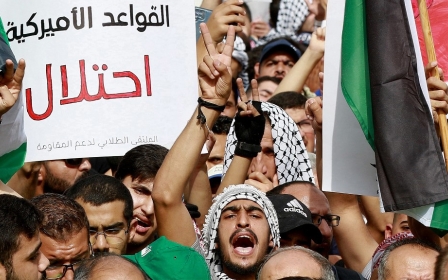How Middle East Muslim scholars are struggling to show support for Gaza
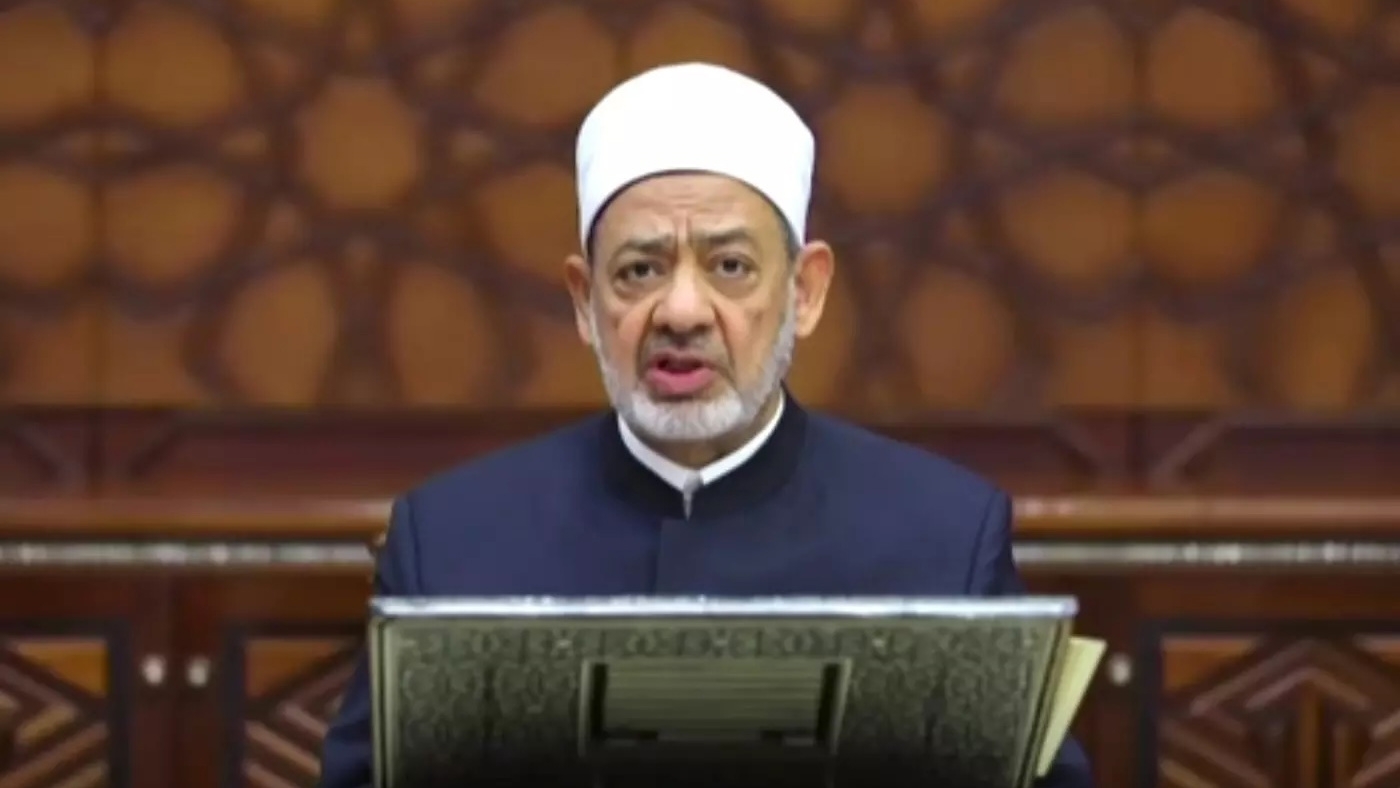
As the war on Gaza enters its third month, there appears to be no let-up in the ferocity of Israel’s bombardment of the densely populated strip of land on the Mediterranean coast.
Last Sunday, it was reported that 700 Palestinians had been killed in the previous 24 hours alone, with the total death toll in Gaza now crossing 18,000, including 12,000 women and children.
Over the past two months, there has been a global surge of empathy for the 2.2 million Palestinian civilians in Gaza who have endured the brunt of this severe assault. Gaza is often referred to as the world’s largest open-air prison, with one British doctor calling it “a graveyard for children within an open-air concentration camp”.
Millions of people have been protesting globally, showing unprecedented levels of support for Palestinians living under Israel’s brutal occupation.
The constant stream of images and videos emerging from Gaza has evoked deep sadness and anger towards a global order that seems to offer unconditional support for Israel's collective punishment of Palestinians.
New MEE newsletter: Jerusalem Dispatch
Sign up to get the latest insights and analysis on Israel-Palestine, alongside Turkey Unpacked and other MEE newsletters
There have also been forceful expressions of support from Muslim religious scholars, known as the ulama, often in rather unexpected ways. While scholars in the handful of authoritarian Arab states that have sought to normalise relations with Israel might be expected to rubber-stamp support for Tel Aviv, this has not always been the case in the context of the Gaza war.
Across the Arab world, many prominent ulama have been vocal in their condemnation of Israel’s assault on Gaza. These include Egyptian ulama who have made questionable political choices in the recent past, most notably in response to the country’s 2013 coup - choices I have systematically scrutinised in my book, Islam and the Arab Revolutions.
Nuanced view
Scholar Ali Gomaa, who fervently backed the military regime of Egyptian dictator Abdel Fattah al-Sisi in 2013, has been a vocal supporter of Palestinian resistance against Israel. In a recent speech to the Egyptian parliament, he spoke derisively of “the Zionist entity” - the designation often used by those who do not view the Israeli state as legitimate.
He described those killed in Gaza as martyrs who were destined for paradise, and enjoined patience in resisting Israel “until God grants His victory”. In another speech at a mosque a few weeks later, Gomaa provocatively described Zionism as a “Nazi movement”.
Follow Middle East Eye's live coverage for the latest on the Israel-Palestine war
While Gomaa also has a history of opposing the Muslim Brotherhood in Egypt, as I document in detail in my book, he is surprisingly nuanced in the case of Palestine.
He acknowledges that Hamas, which is classified as a terrorist organisation in the UK and other countries, has historical links with the Brotherhood (although the former distanced itself from the latter in its 2017 charter). Despite this, Gomaa contends that Hamas must be supported, insisting on the legitimacy of Palestinian resistance.
Scholarly opposition to the war has largely reflected popular opposition to Israel's assault
In another video uploaded to his YouTube page in early November, Gomaa explicitly declared his support for Hamas because of the group’s fight against Israeli aggression.
Notwithstanding the above, it is worth bearing in mind that Gomaa is one of Egypt’s most prominent state-sponsored scholars, and the Egyptian state has long coordinated with Israel to maintain the siege of Gaza down to the present. On this, Gomaa and other state-sponsored scholars have been completely silent.
The mixed messages from such scholars reflect in part their efforts to manage public outrage at Israel’s ongoing massacre of civilians with these scholars’ role as supporters of their authoritarian states.
The belief that Palestinians are engaged in a just struggle against Israeli occupation is echoed throughout the Muslim world among people of various ideological leanings. There is also growing support for the Palestinian cause across North America and Europe. Most of the world’s states, including an overwhelming majority of Global South states, recognise Palestinian statehood.
It is thus no surprise that the vast majority of Muslim scholars who have publicly addressed these issues have expressed outrage over the Global North’s systematic backing of the ongoing Israeli aggression in Gaza. Notably, only a handful of western countries - such as Spain, Belgium and Ireland - have clearly opposed Israel’s massacre in Gaza.
Unstinting support
This outrage has been coming not only from scholars with ideological affinities with the Brotherhood and like-minded movements, but also from less obvious sources, such as the aforementioned Gomaa and Egypt’s most senior religious official, Sheikh Ahmed al-Tayeb. The latter's statements in support of Palestinian resistance have been both frequent and unstinting.
Here, too, however, we must bear in mind that al-Tayeb is a state functionary who, while not entirely compliant towards the Sisi regime, has not voiced any direct criticism at the Egyptian state - formally his employer - for its active coordination with Israel in maintaining the blockade of Gaza for nearly two decades.
This has led to calls by critics for al-Tayeb to travel to the Rafah Crossing in a show of support alongside many other Egyptians for the Palestinians in Gaza. A few weeks into the assault on Gaza, several dozen Islamic organisations penned a letter calling on al-Tayeb to show his support in this way and use his influence as grand sheikh of al-Azhar to help reopen the crossing.
Thus far, he has refused to do so, illustrating the contradictions of supporting Palestine as a state-sponsored scholar working under the Egyptian dictatorship.
Other Muslim scholars have appeared less enthusiastic in their support for Palestine, resulting in widespread criticism on social media from average Muslims and mainstream scholars alike. Many religious leaders serving under authoritarian regimes that gained strength from the post-2013 Arab counter-revolutions have shown an unprecedented level of subservience to power in recent times.
In Saudi Arabia, this is often referred to as the “Madkhali trend”, named after Rabee al-Madkhali, a Saudi scholar who forcefully argues that anything other than absolute subservience to one’s rulers constitutes heresy. A notable example of this trend can be seen in Abdul Rahman al-Sudais, an imam at the Great Mosque of Mecca.
In addition to backing Riyadh’s agenda of normalisation with Israel in recent years, Sudais was attacked a few weeks ago on social media for what critics say was a mealy-mouthed criticism of Israel’s ongoing attacks on Gaza. Additionally, he insisted that the war - which he referred to somewhat vaguely as a “fitna” - should not cause Muslims to question their rulers’ political decisions, presumably including their normalisation of ties with Israel.
Intriguingly, a week later, Sudais came out strongly in support of Gaza, explicitly criticising Israel as “oppressive occupying Zionist aggressors”, thus eliciting praise from erstwhile critics. It is unlikely he would go off-script from the state’s directives, so this might reflect Riyadh’s attempts to balance public horror over Israeli aggression with Saudi Arabia’s agenda to continue moving towards normalisation with Israel.
The Hamas attack on 7 October, and Israel’s ensuing military emphasis on “damage, not accuracy”, has resulted in the deaths of tens of thousands of Palestinians in Gaza. Despite massive western sympathy for Israel in the immediate aftermath of 7 October, the indiscriminate bombing of Gaza has significantly dialled back western enthusiasm for the Israeli offensive. Scholarly opposition to the war has largely reflected popular opposition to Israel’s assault.
While Israel plans to keep bombing until it has destroyed Hamas - doubtlessly killing thousands more Palestinians - the scale of global opposition will only grow louder. It remains to be seen whether public opinion can bring sufficient pressure to bear on western political leaders to recalibrate their virtually unconditional support for Israel, despite what many scholars and legal experts have called a genocide in Gaza.
The views expressed in this article belong to the author and do not necessarily reflect the editorial policy of Middle East Eye.
Middle East Eye delivers independent and unrivalled coverage and analysis of the Middle East, North Africa and beyond. To learn more about republishing this content and the associated fees, please fill out this form. More about MEE can be found here.



